Key takeaways:
- Fear of public speaking is rooted in anxieties about judgment and vulnerability, and recognizing it as a common hurdle can help overcome it.
- Public speaking enhances confidence, fosters connection, and cultivates leadership skills, making it an invaluable asset in various aspects of life.
- Preparation strategies, such as outlining key points and using visual aids, significantly improve speech delivery and audience engagement.
- Techniques like visualization, voice modulation, and positive self-talk can boost confidence and transform anxiety into excitement when speaking publicly.
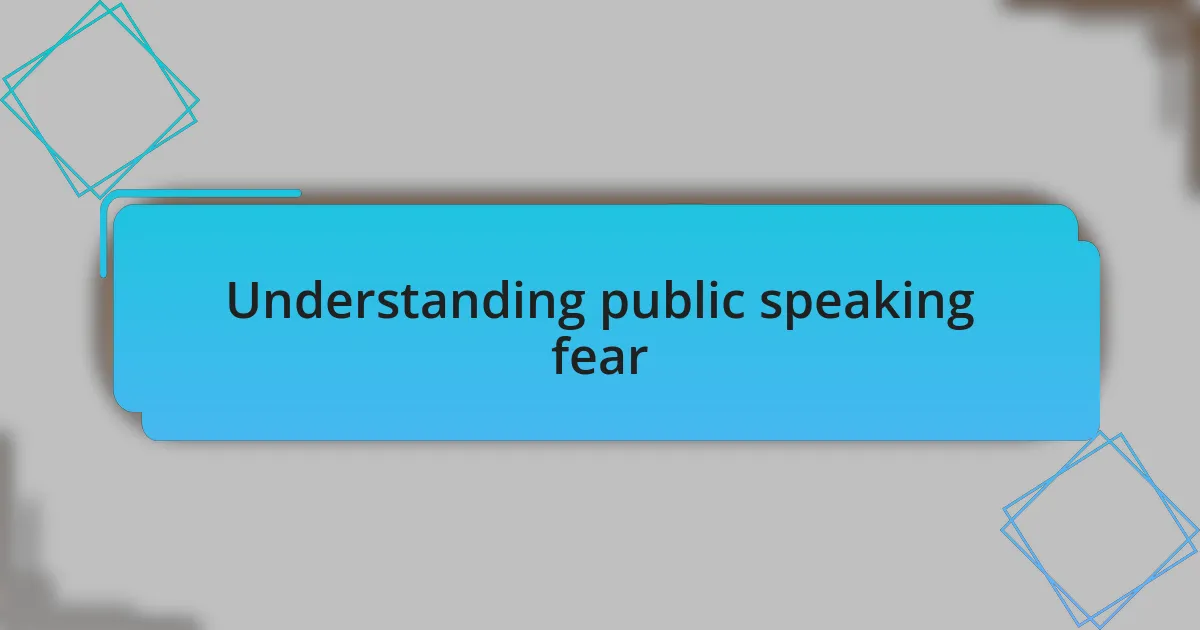
Understanding public speaking fear
Fear of public speaking often roots itself in deep-seated anxieties about judgment and vulnerability. I remember the first time I stood in front of a group; my hands shook, and my mind went blank. It felt like everyone was scrutinizing my every word. Has anyone else felt that intense pressure, as if there’s a spotlight glaring down, magnifying every flaw?
This fear can stem from various sources, whether it’s a past negative experience or simply the fear of failing. Personally, I’ve had my share of moments where my voice quavered and I struggled to catch my breath. That fear can be paralyzing, making you question your abilities. Isn’t it fascinating how something as essential as communication can evoke such strong emotions?
Understanding this fear is crucial for overcoming it. It often leads us to believe we’re not enough, tightly wrapping us in a cocoon of doubt. I’ve learned that the first step in addressing my fear was recognizing it as a common hurdle, not a personal defect. Have you considered how many successful public speakers initially faced this same struggle?
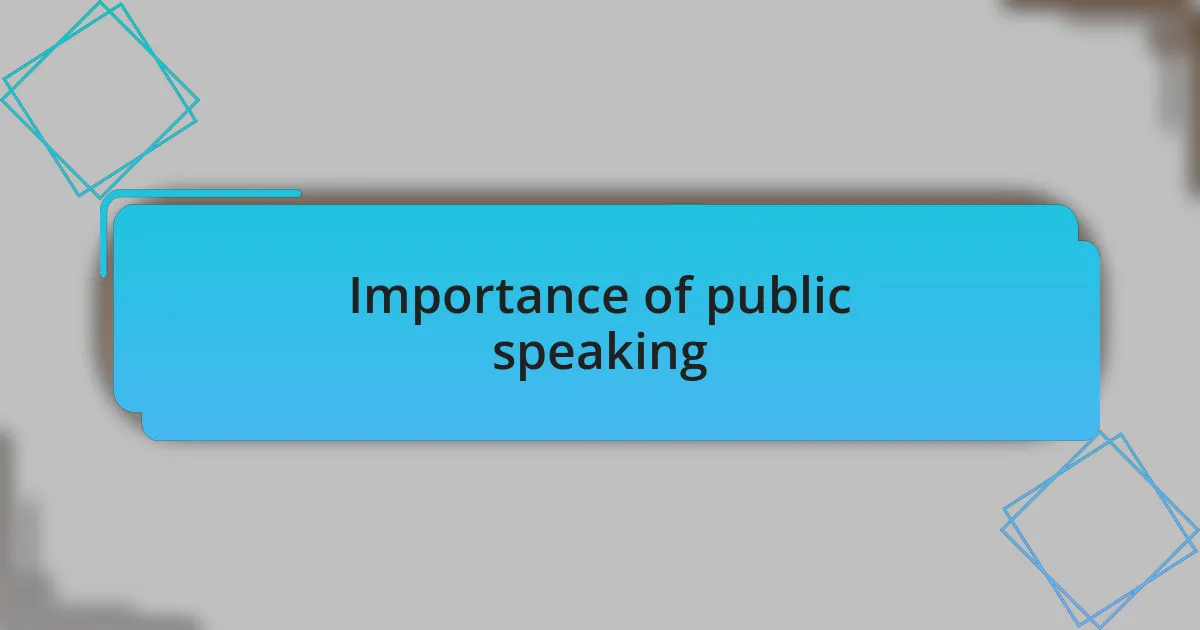
Importance of public speaking
Public speaking is an invaluable skill that extends beyond just delivering a speech; it fosters connection, inspires change, and drives action. I recall how, during a pivotal meeting, my presentation persuaded my colleagues to re-evaluate our approach to a critical project. That moment underscored for me how impactful speaking can be—it’s truly a bridge that connects ideas to emotions.
Moreover, mastering public speaking enhances your confidence in various arenas of life, not just in front of an audience. When I began to practice in smaller settings, like team discussions, I found that my self-assurance grew significantly. Have you noticed how speaking clearly and confidently can shift dynamics in conversations?
Ultimately, public speaking cultivates leadership skills. Those who can articulate their vision and rally others to their cause set themselves apart. In my experience, every time I stepped up to speak, I realized it wasn’t just about the words; it was about inspiring others to believe in a shared vision. How powerful is it to influence and motivate those around us?
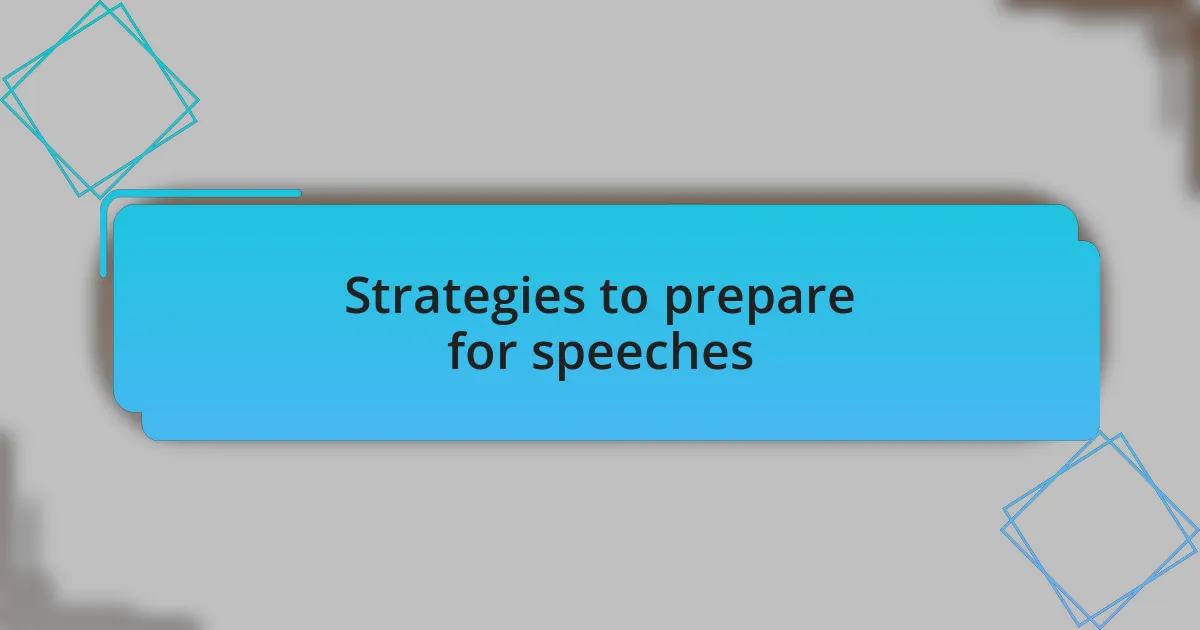
Strategies to prepare for speeches
When preparing for a speech, I found that outlining my main points beforehand was crucial. It helped me structure my thoughts and ensured I covered everything without veering off track. I recall a particular instance where I used bullet points to organize my speech on ethical practices in research. This simple strategy kept me focused, and I could see the audience’s engagement building as I moved seamlessly through my key messages.
On another occasion, I practiced in front of friends who provided honest feedback. This practice not only helped me identify areas for improvement but also made me more comfortable with my material. Have you ever practiced in a safe environment? I think it’s one of the best ways to build confidence and refine your delivery based on real reactions.
Additionally, visual aids became a game changer for me. When I incorporated slides with relevant images and data, I noticed how it not only captivated the audience but also anchored me during the speech. It’s interesting how the right visuals can enhance understanding and retention. Have you tried using slides to complement your presentation? I believe that they can turn a good speech into a memorable experience for both the speaker and the audience.
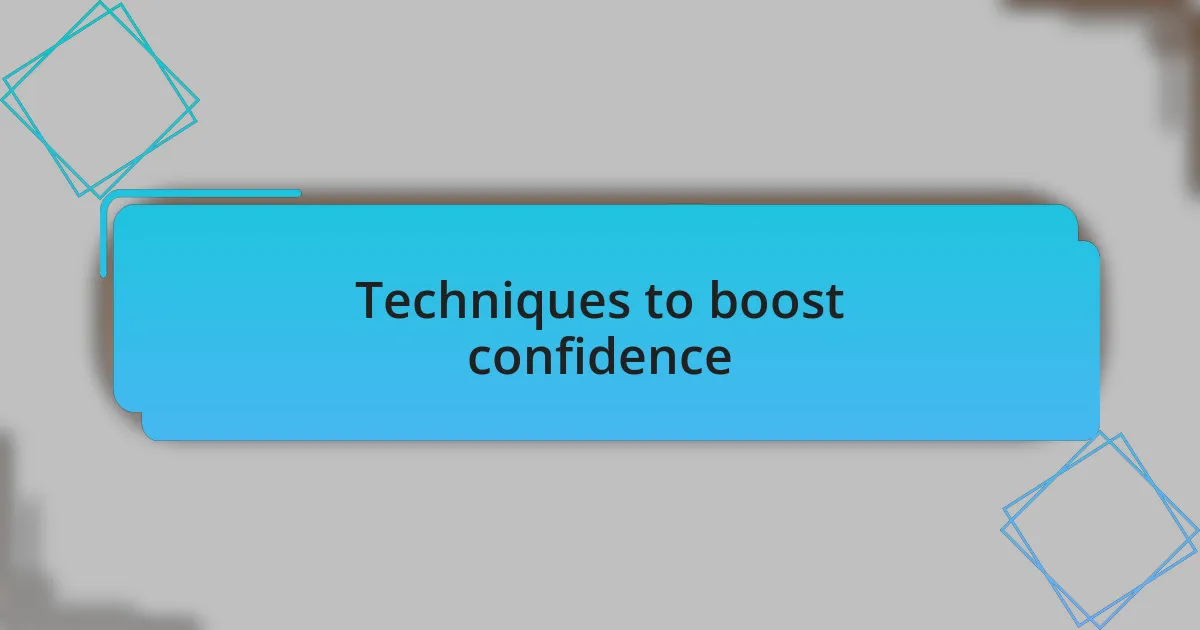
Techniques to boost confidence
One technique that significantly boosted my confidence was the power of visualization. Before stepping onto the stage, I would take a few moments to close my eyes and imagine myself delivering the speech seamlessly. I could almost feel the positive energy from the audience. This mental practice turned the anxiety of public speaking into a sense of excitement. Have you ever tried visualizing your success before a big moment? I found that it transformed my mindset, making me believe that I was capable of achieving exactly what I envisioned.
Another technique that I discovered quite beneficial was voice modulation practice. At first, my voice felt shaky and unsure, but I learned to use it to my advantage. By incorporating varied tones and pacing into my practice sessions, I not only became more confident, but I also made my speeches more engaging. There’s something empowering about knowing you can control how your message is delivered. How do you feel when you hear someone speak passionately? I realized that a strong voice can captivate an audience and command attention, which is really a confidence booster in itself.
Lastly, embracing a constructive self-talk approach was a game changer for me. Instead of focusing on what could go wrong, I started affirming my strengths and capabilities before each speech. I would repeat phrases like, “I am prepared,” and “I have valuable insights to share.” This practice of positive affirmation made a noticeable difference in my composure. Have you considered how your inner dialogue influences your performance? I truly believe that changing the way we speak to ourselves can build a solid foundation for confidence when it matters most.
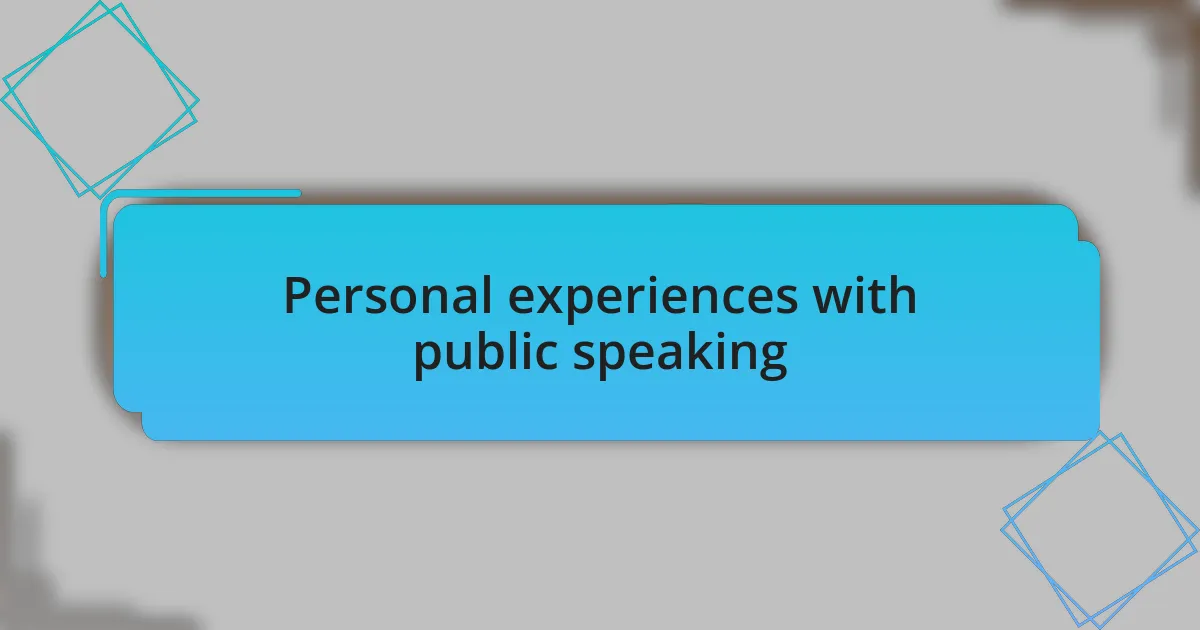
Personal experiences with public speaking
One of my earliest experiences with public speaking was in high school, where I had to present a project on a topic I was passionate about. However, as I stood in front of the class, my hands trembled, and all my carefully rehearsed words seemed to vanish from my mind. I remember the sinking feeling of vulnerability, and I couldn’t help but wonder if anyone else ever felt so exposed. That moment taught me that even seasoned speakers have similar fears; it’s part of being human.
As I progressed in my career, I faced numerous opportunities to speak in front of larger audiences, but there was one particular event that left a lasting impression. I was invited to speak at a community forum about corruption research. Standing before such a diverse crowd, I felt a mix of exhilaration and dread. The moment I stepped into the spotlight, I recalled the power of storytelling. By sharing my personal connection to the issues at hand, I was able to draw the audience in, easing my anxiety as I saw nods of understanding from them. Have you ever found that sharing your own experiences can create a bridge with your audience?
Reflecting on these experiences, I realize that my journey with public speaking was not linear; it was filled with highs and lows. There’s a certain intimacy in facing one’s fears while connecting with others. Over time, each speech became less about the fear of judgment and more about fostering dialogue and change. Does overcoming public speaking fear mean you’ll never feel nervous again? Not at all. Instead, it’s about embracing that nervous energy and transforming it into a platform for sharing ideas that matter.
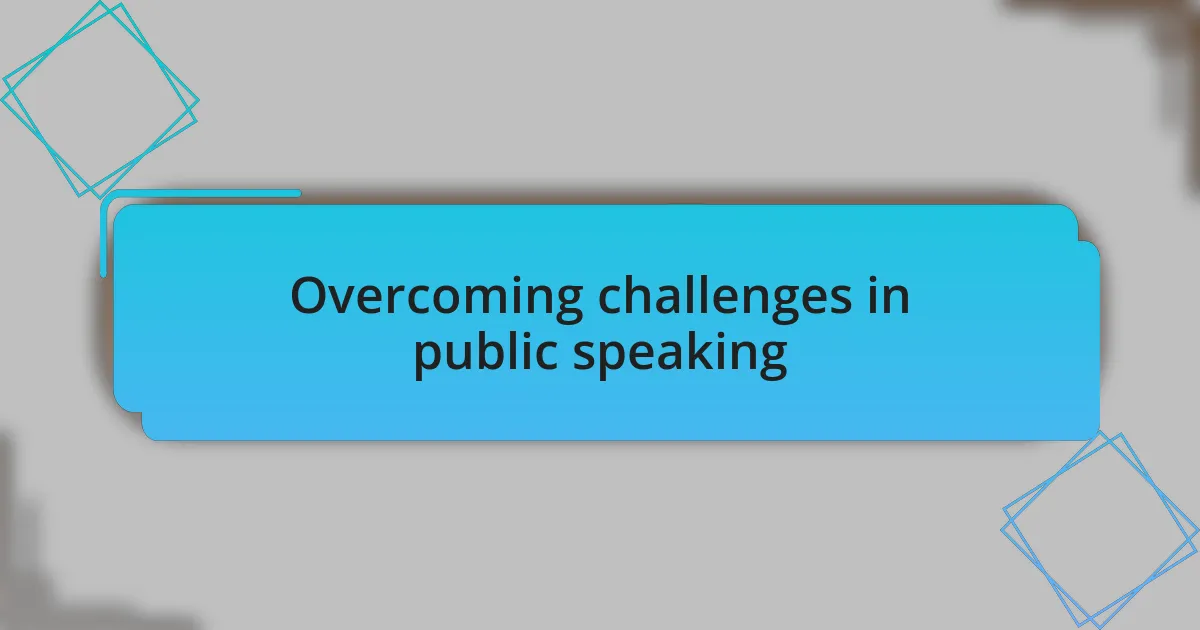
Overcoming challenges in public speaking
Every public speaking opportunity comes with its own set of challenges, and I learned to see them as stepping stones. I once had to present at a roundtable discussion on corruption, and just before my turn, I felt my heart race and my palms sweat. In that moment of panic, I took a deep breath and reminded myself that the audience was there to listen, not to judge. That shift in perspective helped me realize that vulnerability can be a strength.
In another instance, I struggled to convey complex information on transparency measures in a concise way. I remember jotting down a detailed speech but quickly realized I needed to simplify my message. By focusing on a clear narrative and relatable examples, I found that my nervousness faded as clarity took its place. Have you ever had to simplify your thoughts on a topic? It can be liberating when you break it down for your audience.
Through these experiences, I’ve discovered that preparation plays a crucial role in overcoming public speaking fears. I often spend time rehearsing in front of a mirror or sharing my content with friends who can provide constructive feedback. Their reactions offer invaluable insights into my delivery. It’s fascinating how honing the message and practicing can turn a fear-filled moment into an opportunity for genuine connection.